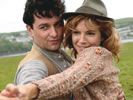Eye For Film >> Movies >> The Edge Of Love (2008) Film Review
As you'll know already the Edinburgh Film Festival this year kicked off with the world premiere of a very British affair - or perhaps it could be more accurately described as a very Welsh set of affairs - in John Maybury’s The Edge Of Love.
Loosely based on real events, this ensemble piece follows the life, loves and internecine relationships of Welsh poet Dylan Thomas during the Second World War. He was as famous for his drinking and womanising as for his poetry and the seductive timbre of his voice, and Dylan acolytes won't be disappointed by Matthew Rhys’ engaging performance as the poet genius. He plays him like an adult version of a lost child, who survives and gets by on the skin of his teeth using his own unique brand of inebriated wit and charm.

Maybury, who previously won The Michael Powell Award at this very film festival for his impressive directorial debut Love Is The Devil, is clearly interested in depicting intense relationships in claustrophobic settings. Here, he projects the same qualities but with a bigger and more ambitious palette. The thematic and visual similarities between the films are very apparent but here the production values (and obviously the budget) are greatly magnified.
Although Maybury’s second feature The Jacket could also be described as claustrophobic, with an intense relationship at its heart, the only thing he’s taken from that disappointing turn is its female lead, Keira Knightley, who here plays Vera Phillips, Dylan Thomas’ first love and childhood friend. It’s a good performance from Knightley but nowhere near the heights of her extraordinarily accomplished turn in Joe Wright’s magnificent version of Pride And Prejudice, nor the quality of her appearance in the same director's later work, Atonement. And there are some strange parallels between those films.
Something that might unfortunately jar for Edge Of Love audiences are the visual similarities between her role in Maybury’s new film and Atonement. Seeing her once again in period costume in the same era, once again walking through London’s underground and once again dealing with her lover going off to fight and be traumatised in the same war was for me a distracting comparison to have come so soon afterwards. A colleague leaned over during the screening and whispered, "Are we watching Atonement again?", so I obviously wasn’t alone in thinking this. But these are minor quibbles, for overall this is a riveting relationship drama that sucks you into the intricacies of two couples trying and essentially failing to share each other's love and friendship.
The first half of the film belongs to the poet, reluctantly employed in the war effort providing patriotic voiceovers for propaganda films. After running into Vera in a bar, the flame of his childhood love with her is brightly rekindled, which doesn’t sit too well with his wife Caitlin (played by Sienna Miller, still going from strength to strength after her roles in The Factory and Interview).
The two women begin an initially awkward friendship with Dylan placing himself squarely in the middle, jostling for the affections of both. As if this isn't enough of a pickle, along comes the handsome and broodingly intense Sergeant Killick (Cillian Murphy) whose involvement in the story dominates the second half of the film. Coupling off with Vera and moving into the same squalid household, the joyful sharing of friendships and love is matched only by the bitter jealousies, suspicions and simmering resentments that build up under the surface.
This eventually leads to an explosive confrontation revealing either the noble or sadly pathetic qualities dormant in each character. But it’s only at the end in a moving moment of sudden heartbreaking realisation that we realise the whole film is really about the demise of one great friendship within the whole quartet.
But for me it was Cillian Murphy’s traumatised sergeant who stole the film. In all of his roles he’s had a bit of a light around him as an actor, with a truthful simplicity to his gestures and mannerisms. You can’t take your eyes off him in every scene he’s in, even when he’s in the background, and his depiction of a slightly shell-shocked soldier in a world that then didn’t know of such things lingered in my mind long afterwards.
The Edge Of Love is let down by a more rambling and incoherent second half where we don’t get a real sense of who the drama is really about, and at times it is hard to sympathise with any of the characters, as they rarely rise above their petty needs, insecurities and tragic behaviour. In terms of dramatic strength, the penultimate scene, an act of courtroom betrayal by Dylan Thomas (which really did take place – albeit perhaps for different reasons), risks killing the film and sympathy for two of the main characters stone dead. Fortunately the film is resurrected by the last scene.
It's a sumptuously made and hypnotic film, beautifully lensed by Jonathan Freeman with impressive production design and art direction. There’s one terrific scene with an almost Gone With The Wind-esque quality when Vera starts singing in Killick’s arms against the backdrop of wartime flames and destruction. I wish this had lasted longer so as to linger on the pleasure of seeing a moment of pure cinema, that strange and wonderful place films rarely go, when they do something a little off the beaten track. Here they cut away from it too soon but it's still a great little sequence. This doesn't really break any new ground but purely on a technical level The Edge Of Love is an enjoyable and accomplished achievement.
Reviewed on: 22 Jun 2008




















